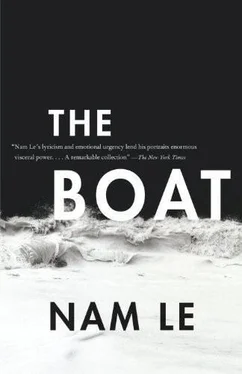Mahmoud walked behind them, leaving a buffer between his body and theirs.
"I thought the worst, of course. They'd found us out. Or they were gathering all their people to attack us on Thursday." She looked around, askance. "It's happened before."
They passed a jewelry shop glittering gold, silver, crystal. Out front, a group of men were arguing animatedly. They all had the same puffed-up hair, all wore what looked to be hand-me-down suits from the eighties. Across the street, Sarah saw the upper half of men's bodies draped over scooter handlebars, the bottom half of their faces darkened by short beards. Mahmoud caught her eye and held it coolly for a moment.
"What it was," said Parvin, "was they'd put together a play. That was the big secret."
"A play?"
"Oh, Sarah — you should have seen it." She pinched up the thigh of her robe as she stepped over a reeking culvert. Ruts ran all over the road and sidewalk, trickling waste into the gutters. "One of them had a little sister. Thirteen years old. She wanted to be an actor too." Parvin scaled her voice back. "Last month they arrested her — for 'acts incompatible with chastity' "
"What's that mean?"
"Then they held her for two weeks of tests and interrogation." She spun around to face Sarah. "Were you searched? At the airport?"
Sarah shook her head. Parvin nodded, walked on. Unbidden, a particular case from her pre-travel research surfaced in Sarah's mind. Zahra Kazemi, Canadian journalist, detained for taking photos during a protest — then beaten, with a guard's shoe, into a coma. She remembered the picture she'd seen: a late-middle-aged woman, her baggy chocolate-colored sweater lending her a girl-like air. She remembered the camera hanging from her neck, its black lens a well beneath her own calm, deeply settling face.
"Last week," said Parvin, "she was hanged. This little girl. All this is in the play. It's sentimental, and a bit slapstick, I'll admit, for a tragedy — but they only had a week to throw it together." A steeliness Sarah had never heard before now reinforced her friend's voice. Parvin flipped her thumb — a hitchhiker's gesture — behind her, toward Mahmoud. "But he's not a fan."
"Too much!" said Mahmoud. Sarah turned. His Adam's apple jogged pronouncedly above his collar. "I said it is not a play for Ashura."
"It's the perfect play for Ashura," Parvin spat. "It's a very religious play."
They'd reached the car. Parvin stood by the passenger door and stared directly at Sarah. "Those men ," she said, curling her mouth on the word, "those men of God, do you know how they enforce God's law?" She'd brought her voice under control, but tension clenched her shoulders and neck. "They kidnap this girl on an immorality charge. Then they test her — but find out she's still a virgin."
"Parvin," Mahmoud implored. "Please get in the car."
"So what do they do? They marry her, so they can rape her. They rape her — so they can kill her — so she won't go to heaven, where all the virgins go." Her nostrils flared in the middle of her rough, square face. "Men of God," she said.
A block away, drums were beaten as though into the.ground, trembling the very concrete. Mahmoud 's eyes searched the street.
To her surprise, Sarah felt a swell of sympathy for him — even as she found herself exhilarated by Parvin's rage. No one else she knew, it occurred to her, would ever dare speak so critically of Islam. Parvin got in the car. She looked down at her lap for a long time. Then, in a softer, effortfully lighthearted tone, she said, "And what about Sarah? If she has to wait till after Ashura, she'll miss the play."
"How long are you staying?" demanded Mahmoud. He pinned her with his gaze.
Sarah smiled weakly. "Six days."
The engine clattered to life and they pulled away, the parade diminishing behind them. Mahmoud drove and didn't talk. Parvin was quiet now too. They merged with traffic on a busy one-way street and seemed to drive directly into smog. Sarah looked out, her head as clouded as the air, the thoughts within it churning shallow and fast. It felt inconceivable she'd been here only a few hours. She slackened her attention and almost convinced herself she was home again: slate-gray sky, concrete-walled compounds, poured-cement yards, a roofline rife with billboards and signs. But wherever she looked, just underneath the outside of things, something was always slightly off: ordinary buildings listed toward, or away from, one another-their lines never quite plumb; straight roads turned into alleys wending into dead ends. And words — words everywhere — on trucks, street signs, T-shirts — seemed like language that had been melted, meandering up and down like quavers and clefs on invisible staves. The car climbed to higher ground. Sarah stuck her whole head out the window, letting the wind crunch her scarf against her ears. On every other corner she thought she heard an English-speaking cadence — recognized someone from home — but then the realization set in. Parvin was here. Otherwise she was alone. People looked at her and understood that. She was completely extraneous.
As they repaired to the quieter, more affluent boulevards of northern Tehran, it felt like they were entering a different country. At one point they crested a rise and ahead, through a green canopy, materialized the full spread of the Elburz Mountains, stately and snowcapped, slopes dappled with sun and cloud and shadow. Mahmoud turned up a narrow street. They stopped in front of an old, weatherworn villa, which, Sarah was astonished to learn, belonged to Parvin's family.
What she noticed first, entering the room, were the women seated at the long dining table. They'd shed their robes, four or five of them, and their hair was uncovered. Several men were present, too, standing across the room next to a set of ornate sofas. Mahmoud immediately joined them. Platters of bread, goat cheese, pistachios and yoghurt were laid out on tables.
Conversation paused when Sarah walked in.
"This is Sarah Middleton," announced Parvin, pushing her scarf back onto her neck like a hood. "Who I told you about. My best friend." She repeated the introduction — more emphatically, it seemed — in Farsi.
A couple of the women nodded to Sarah. "Come, sit down," said one. She sat by herself at the far end of the dining table.
"Thank you."
The woman poured tea into a glass shaped like an egg timer and handed it to Sarah. She slid a vase of pink-blue gladioli out of the way. "My name is Roya," she said. She was young but there was a subtle dourness about her face that weighed on her features. Her body was stout, small-breasted, and she wore a tight T-shirt with a Chinese character embossed on it. It seemed on her almost a parody of youthful fashion. She said, "So you are the one."
"The one?"
"The one whose heart is broken." She peered into Sarah's face. "You must forgive my English."
Sarah turned sharply to Parvin at the other end of the table. She was absorbed in conversation with the group of women. Sarah turned back. Who was this woman? What did she know? Her comment felt to Sarah almost spiteful. Now Roya leaned in closer.
"I have wine too," she said.
Sarah gave a terse shake of the head.
"It is made by my parents. I know where they keep it upstairs. And their opium, too — if you prefer."
Mahmoud said something aloud and immediately the men unbunched and came over to the dining table. He was the shortest of them all, Sarah saw, yet they all treated him with noticeable deference. Sarah stood up. She felt like being alone.
"No," Parvin called out from across the table. "Stay. You should stay."
"I will translate for her," said Roya. Parvin smiled at both of them before turning back to her discussion.
Something occurred to Sarah. "You live here?"
Читать дальше











